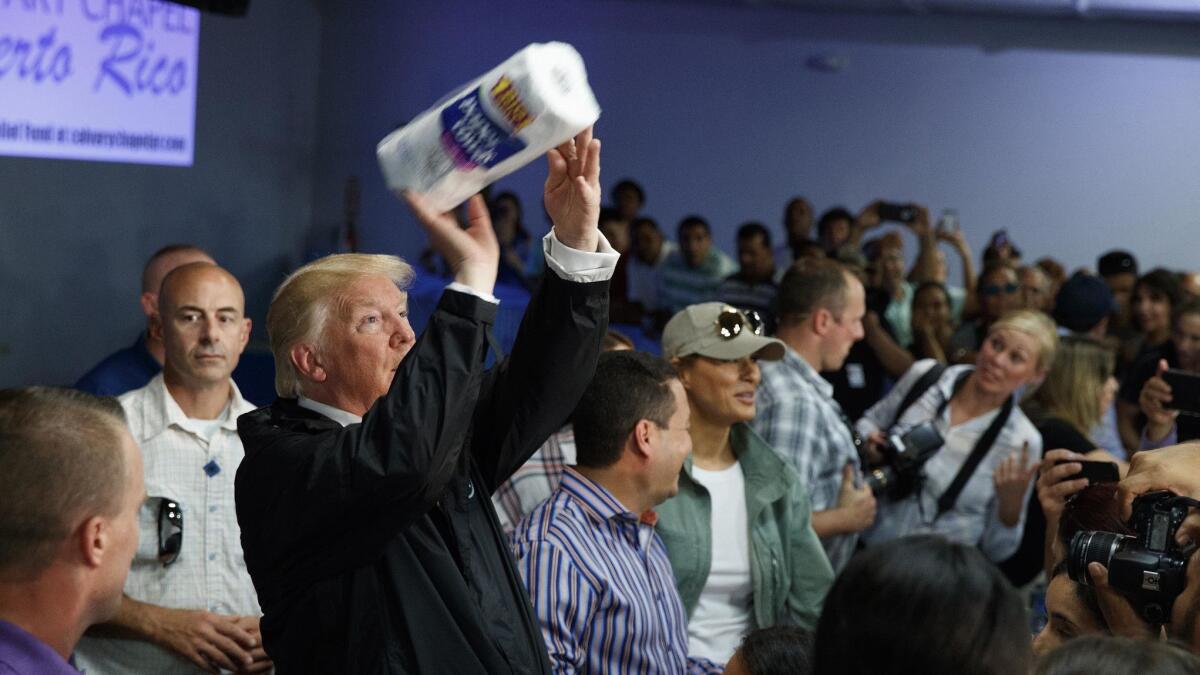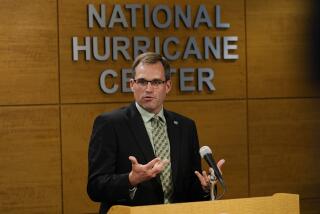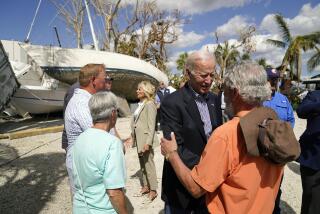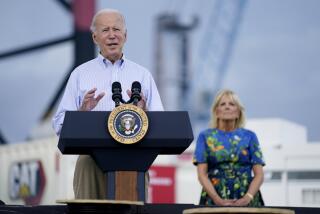Trump showcases plans for 2018 hurricane season as he’s remained silent about Puerto Rico’s death toll and lingering problems

President Trump on Wednesday staged a briefing on federal preparedness for the hurricane season now underway, repeatedly lauding his administration’s “incredible job” last year while remaining silent on Puerto Rico’s lingering problems and new estimates of its massive death toll.
The president, who last fall said Puerto Rico had averted a “real catastrophe” because only 16 islanders had died after Hurricane Maria hit Sept. 20, has not addressed independent reports of a much higher toll — including one last week conducted by Harvard researchers and published in the New England Journal of Medicine estimating that 4,645 or more people may have died in the aftermath.
White House spokeswoman Sarah Huckabee Sanders, asked on Tuesday whether Trump would still give his administration a score of 10 on a scale of 1 to 10 for its response in Puerto Rico, did not give a direct answer.
“The federal response, once again, was at a historic proportion,” Sanders said, declining as before to say whether the White House accepts the new estimate.
“I can’t speak to how this White House operates,” said Michael D. Brown, who as head of the Federal Emergency Management Agency was much criticized, along with President George W. Bush, for the government’s response to Hurricane Katrina in 2005. “But I would have gotten a call from President Bush or his chief of staff asking, ‘What the hell is this study? Read it, tell us what it says and see what we can do.’
“Irrespective of what this White House might say, tweet or do — and I don’t want to get the people in FEMA in trouble here — but I can tell you that they’re desperately looking to that study to see, ‘What can we learn from this?’” he added.
The sense that Bush botched the response to Katrina, especially in the hardest hit, mostly African American areas of New Orleans, damaged his standing for the remainder of his second term. “Katrina” came to be synonymous with incompetence more broadly, prompting Republicans and some pundits to ask throughout President Obama’s tenure whether some problem might become his Katrina.
Trump, by contrast, has seemed to escape such judgment when it comes to the federal response in Puerto Rico, which still suffers widespread power outages that cripple schools, hospitals and commerce. Indeed, he continues to praise his administration’s response.
Observers in both parties see a couple of forces at work: the press of other controversies surrounding the president, and the fact that much of the public does not think of the more than 3 million Puerto Ricans as fully Americans, too.
“Historically, when thousands of American lives are lost in large part due to government negligence, there would be some public backlash, congressional hearings, inspector general reports, and just some basic accountability so that it wouldn’t happen again,” said Stephanie Cutter, a longtime Democratic strategist who worked in the Clinton and Obama White House.
The answer to why that hasn’t happened regarding Puerto Rico’s devastation “is complex,” Cutter added, “but basically the majority of Americans are outraged about so many of his actions that it’s difficult for specific things to break through. And this Congress has proven incapable of acting like an independent branch of government.”
Puerto Rico’s official death count in the wake of Maria, based on actual bodies identified, is 64, although the island’s government has commissioned a more thorough effort to count the dead. Even the official estimate is still four times more than Trump acknowledged in his last public comment on the impact — when he last visited the island in early October.
On that visit, he told officials, “Now, I hate to tell you, Puerto Rico, but you’ve thrown our budget a little out of whack because we’ve spent a lot of money on Puerto Rico. And that’s fine — we’ve saved a lot of lives.”
He continued: “If you look at a real catastrophe like Katrina, and you look at the tremendous hundreds and hundreds and hundreds of people that died, and you look at what happened here with, really, a storm that was just totally overpowering — nobody has ever seen anything like this.”
“Sixteen people versus in the thousands,” he said. “You can be very proud of all of your people, all of our people working together.”
The death toll from Katrina was 1,833 people.
In addition to the most recent study, by Harvard University’s T.H. Chan School of Public Health, other surveys have estimated that more than 1,000 Puerto Ricans died in the weeks after Maria as either direct or indirect results of the storm. The Harvard study concluded that “the number of excess deaths related to Hurricane Maria in Puerto Rico is more than 70 times the official estimate” of 64 deaths.
The authors said, however, “this number is likely to be an underestimate,” with the actual toll exceeding 5,000.
The estimate covers the months from Sept. 20 through the end of 2017. One-third of the deaths, the study said, were the result of “delayed or interrupted healthcare,” just as in the aftermath of other storms including Katrina, Hurricanes Harvey and Irma, which struck before Maria last year, and Superstorm Sandy on the East Coast in 2012.
“As the United States prepares for its next hurricane season, it will be critical to review how disaster-related deaths will be counted, in order to mobilize an appropriate response operation and account for the fate of those affected,” the authors wrote.
More to Read
Get the L.A. Times Politics newsletter
Deeply reported insights into legislation, politics and policy from Sacramento, Washington and beyond. In your inbox three times per week.
You may occasionally receive promotional content from the Los Angeles Times.






